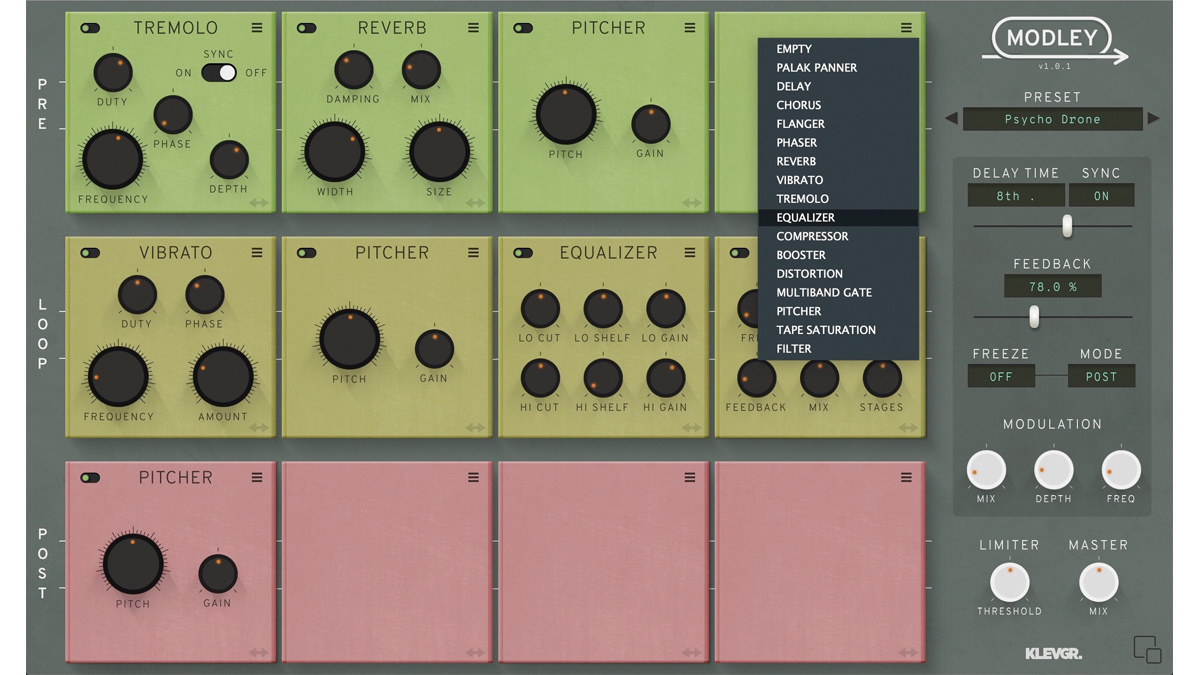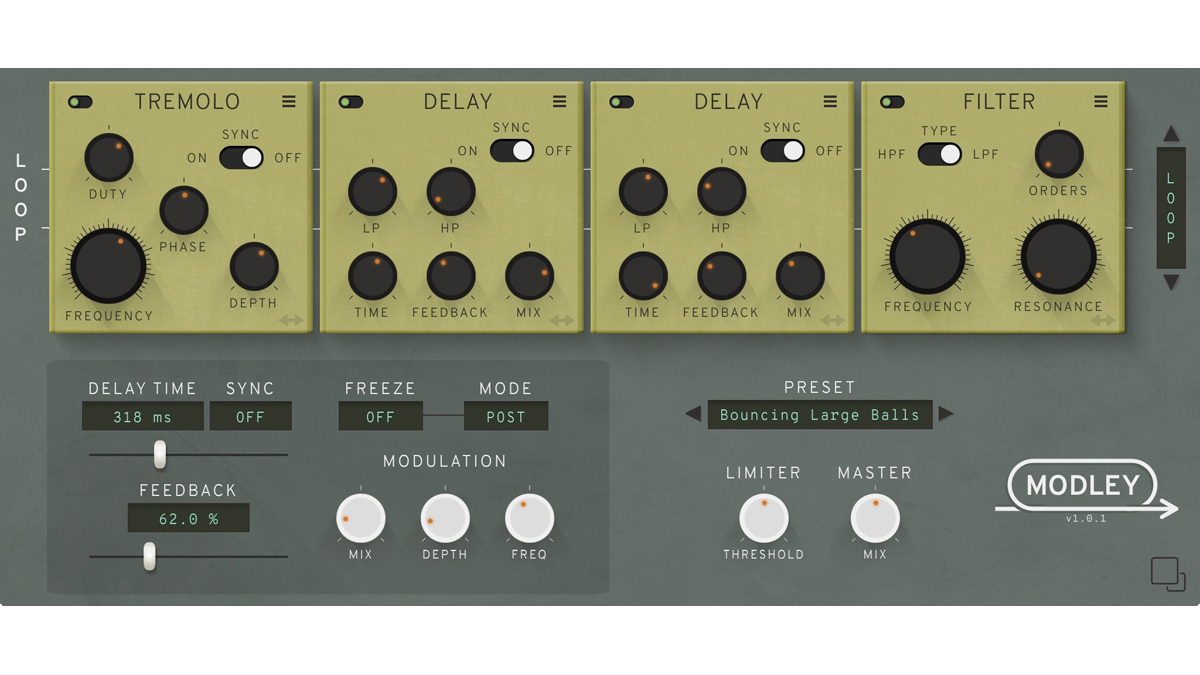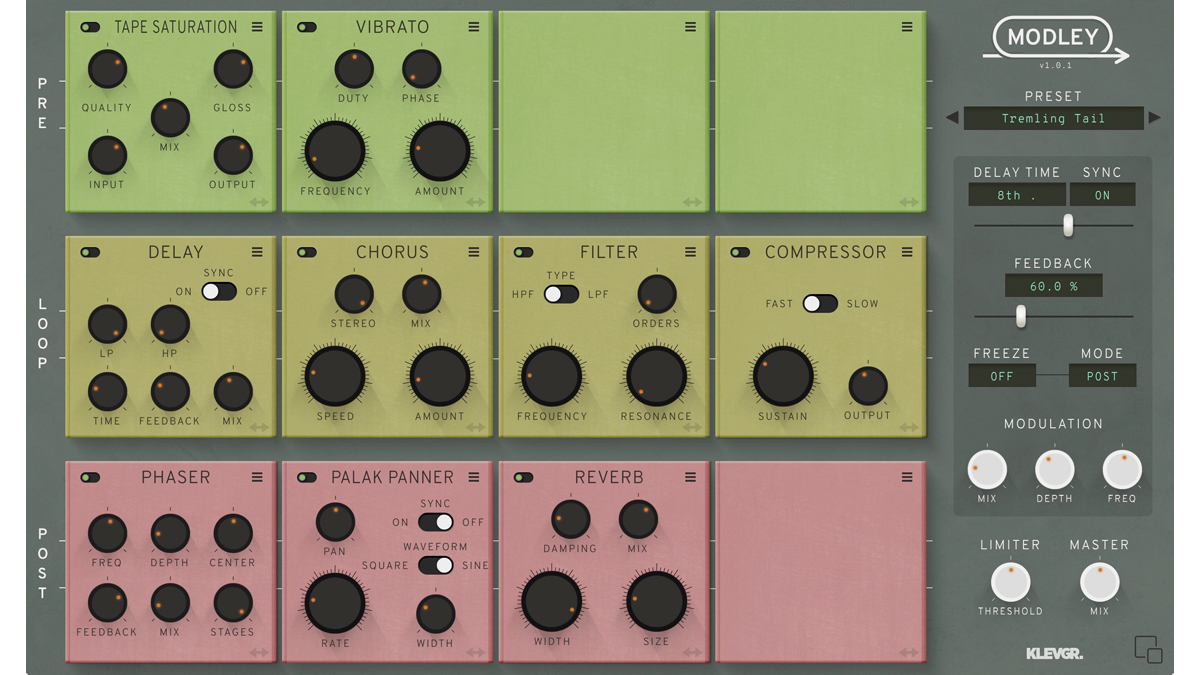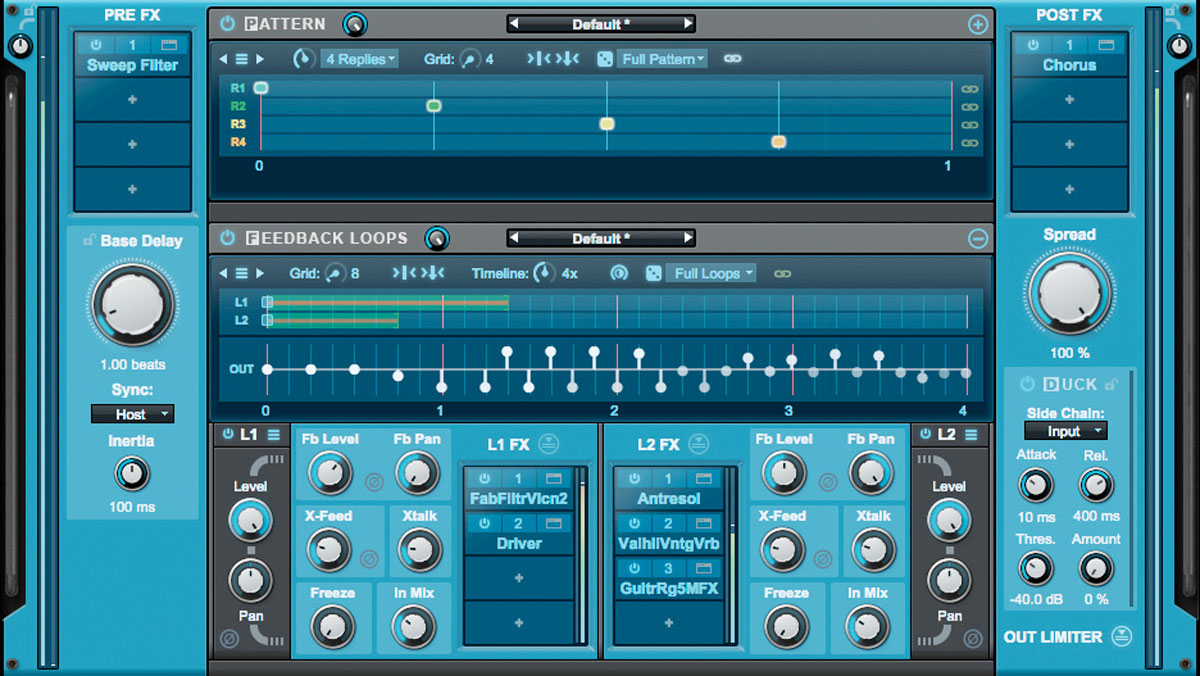MusicRadar Verdict
Much more than just a delay plugin, Modley is indeed a wild and wonderful playground of feedback loop manipulation
Pros
- +
A delay with an effects rack inside!
- +
Cool line-up of 16 effects modules
- +
Pre, Post and Loop Racks
- +
Delay time modulation LFO
- +
Freeze setup is great fun
Cons
- -
No module presets
- -
Could be more visually stimulating
MusicRadar's got your back
What is it?
Described as a “delay playground with endless capabilities”, Modley is a multieffects plugin (AU/VST/AAX/AUv3) built within and around a feedback delay loop.
Each of its three rows of four cells is a series of effect inserts, with the top row - the Pre Rack - processing the input signal before it enters the delay line, the bottom row of four cells applied after the delay line, and the middle row doing its thing between the input to and output from the delay line - ie, directly inside the feedback loop itself.
Clicking the top-right button in a cell opens Modley’s menu of 16 effects, which is the same for all three Racks. Once instantiated, modules can be dragged between slots within a Rack but not between Racks, and modules for which such functionality is appropriate - Reverb, Chorus, Phaser, Delay, Flanger and Tape Saturation, but not Compressor, surprisingly - feature dry/wet Mix controls for individual balancing.
Of course, the differences between placing a given processor in the Pre, Loop or Post Rack range from subtle to decidedly profound, depending on the module. The Pre and Post Racks are only applied once, before and after the delay line, but with the Loop Rack being in the delay line, the signal passes through it multiple times before reaching the Post Rack, as determined by the Feedback amount.
This causes the effects in question to build up with each repeat, the multiplicative results of which vary according to the processes involved. The Filter module, for example, serves up that classic, increasingly distorted dub delay sound, while Pitcher pitchshifts the signal with each loop, rising or falling progressively and continuously until the feedback drops off; and the tail of the Reverb effect can be made to feed back on itself – to potentially ear-shattering levels if the onboard Limiter isn’t deployed.



Performance and verdict
The controls for the delay line are housed in the right-hand panel (or at the bottom if the more compact alternative view mode is activated, whereby only one Rack is visible at a time). The Delay Time ranges from 0-4000ms when the Sync option is turned off, or 1/64T to 1 bar dotted when Sync is on. The Feedback slider below determines the amplitude at which the delay line output is fed back to the input, up to a positively dangerous 200%; and clicking the Freeze button freezes and loops the delay buffer, the length of which is equal to the Delay Time.
This last is made more creatively useful than many equivalent implementations by the ability to manipulate the Delay Time while Freeze is active, yielding all kinds of unpredictable stretching and shifting noises, and toggle the ‘capture point’ between Pre and Post effects, again even when Freeze is On.
Want all the hottest music and gear news, reviews, deals, features and more, direct to your inbox? Sign up here.
LFO Modulation of the delay time is also on the cards, for automated pitch wobbling. Modulation Depth and Mix knobs set the amount of modulation brought to bear and its blended prominence, while the LFO Frequency runs from 0.01Hz to 4Hz. As well as its primary role of adding a variable degree of analogue- style pitch fluctuation to the sound, the modulation LFO is also useful for reining in excessive static frequency build-ups caused by certain effects in the Loop Rack (Reverb, for example) by constantly deviating the pitch.

Few plugins can do what Modley does, Blue Cat’s Late Replies being the only directly comparable alternative we can think of. Despite being, in literal terms, a multieffect, the emphasis is still essentially on delay, but with detailed, independent tailoring and processing of the three stages of the signal path, most notably the feedback loop. There are countless delays out there that allow for filtering of the feedback circuit, but Modley takes that age-old concept much further, enabling the same layer- upon-layer repetition to be explored with distortion, reverb, pitchshifting, modulation effects and all the rest.
Crucially, the 16 modules sound great individually and even better in combination, enabling radical transformation of any instrumental or electronic source, as well as more delicate treatments – intriguing spatialising, softly distorted echoes and so forth.
At this price, however, perfection is a big ask, and there are some minor issues here. One is the drab interface. Modley is a joyously polychromatic thing, sonically, and Klevgrand normally use inventive graphics: so why the dreary module design? Then there’s the lack of module presets: we’d have liked to be able to save effect module settings for later recall. That aside, though, for the price, it’s unmissable.
MusicRadar verdict: Much more than just a delay plugin, Modley is indeed a wild and wonderful playground of feedback loop manipulation.
The web says
"Modley is one of the most powerful, exciting and just plain damn excellent effect apps you’ll ever use." The GarageBand Guide
Hands-on demos
The GarageBand Guide
Jakob Haq
The SuperFunAwesomeHappyTime Pedal Show!
Specifications
- 15 different effect modules – Panning modulation, Phaser, Distortion, Tape Saturation, Pitch Shifter, Delay, Reverb and much more
- Time sync
- Global modulation of the delay
- Built-in limiter
- Freeze function, with pre- or post-loop processing
- Lots of presets to kickstart the creative flow
- Dry/wet mix
MusicRadar is the number one website for music-makers of all kinds, be they guitarists, drummers, keyboard players, DJs or producers...
- GEAR: We help musicians find the best gear with top-ranking gear round-ups and high-quality, authoritative reviews by a wide team of highly experienced experts.
- TIPS: We also provide tuition, from bite-sized tips to advanced work-outs and guidance from recognised musicians and stars.
- STARS: We talk to musicians and stars about their creative processes, and the nuts and bolts of their gear and technique. We give fans an insight into the craft of music-making that no other music website can.
